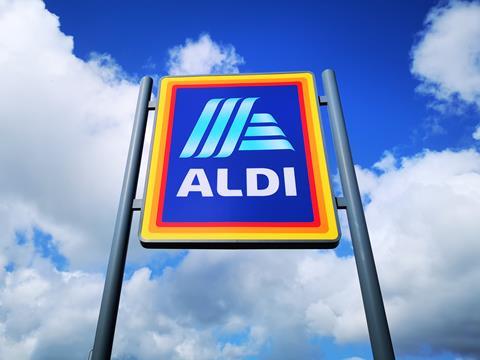German discounter says the banana prices it pays to its suppliers will be fairer and more accurately reflect sustainable production costs

Representatives from Latin America’s banana industry have welcomed plans from Aldi to implement more responsible and transparent purchasing practices to improve the sustainability of its banana supply chain.
The move follows intensive lobbying from Latin American producing countries to persuade retailers to adopt a more realistic pricing structure in the face of soaring production costs.
The German discounter, which has set the benchmark price for fresh bananas in the European market for almost two decades, has faced growing accusations of hypocrisy for demanding increasingly stringent social and environmental standards while driving down the price it pays for the fruit.
Aldi’s decision to raise its banana price by €0.09 per kg at the start of 2022 was met with an underwhelming response from Latin American producers. They argued that while it was step in the right direction it was nowhere near enough to offset rising costs.
Earlier this month, Aldi published details of its new approach on its website. “We are aware that all supply chain stakeholders (including retailers), have a vital role to play in creating a banana sector that is socially, economically, and environmentally sustainable,” it reads.
“Both Aldi’s and our partners’ current and future actions will support human rights and the environment. We are further integrating corporate responsibility into our buying to help deliver our long-term goals, but we can’t do this alone, it is a shared endeavour. Everyone involved contributes to a sustainable and fair banana supply chain.”
In what appears to be the adoption of a more collaborative approach with suppliers, Aldi said it plans to strengthen the sustainability of its banana supply chain “via an approach developed with our strategic suppliers”.
“We are implementing more responsible purchasing practices and further increase the transparency of production costs,” the retailer said. “This improvement to our buying process means that critical cost changes and cost fluctuations that impact all supply chain stakeholders can be addressed much better together.
“During 2022, we collaborated with selected key business partners to identify relevant cost factors (including, for example, labour on farms or other production costs) that could be reflected in a joint open-book costing approach.
“This approach ensures that the banana prices we pay to our suppliers are fairer and more accurately reflect sustainable production costs. This means that we are directly benefitting producers and workers, instead of the money being absorbed along the supply chain.”
Aldi continued: “Our approach goes beyond ring-fencing cost items in negotiations. By following a partnership approach, jointly setting adequate cost factors, or identifying suitable benchmarks, we take into account critical price developments for all relevant costs (e.g., packaging, fuel or logistics).”
Aldi said it regularly collects production costs from Fairtrade-certified banana producers and would take these into account as part of its price setting process.
“This does not involve paying the Fairtrade minimum price for all our bananas, but only for the Fairtrade-certified bananas,” the retailer said.
“What it means is that changes to the cost factors underpinning the Fairtrade Minimum Price will be considered in our sourcing. This is an essential step to better identify and further mitigate price fluctuations that can negatively impact workers and stakeholders at production level.”
Aldi said its goal is to source at least 80 per cent of bananas from suppliers with a good CR performance. “Shifting our buying volume to those suppliers with a good CR performance, CR management system and set-up provides an incentive for our business partners to invest in continuous improvements,” the retailer said.
Richard Salazar, executive director of Ecuadorean exporter association Acorbanec, welcomed Aldi’s new approach. He recently met with Franka Rodriguez, global sourcing director of the Aldi South group, to discuss the pressures facing producers.
“We encourage Aldi’s implementation of more responsible purchasing and transparency of production costs in the supply chain, to better address fluctuations,” he said.
“We also support their use of changes in the cost factors that underpin the Fairtrade minimum price, and which are published annual by Fairtrade International. Changes to these cost factors will be considered accordingly in Aldi’s pricing of bananas.”
Jorge Sauma, general manager of Costa Rican banana association Corbana, told Fruitnet: “This is a very good message from Aldi. Improving the price structure, which is fair, will help improve environmental and social practices and will make bananas a more sustainable product.”
“Aldi’s important position in the value chain makes it a reference in the sector which I believe will have positive effects on the banana chain.”
Sauma said Costa Rica had made great efforts to improve social and environmental conditions in the sector over the past 20 years, including providing primary education to the family of workers, recycling 100 per cent of plastics, and reducing its carbon footprint.
“Our congratulations to Aldi for this important effort to promote a more sustainable product, since many families depend on the banana industry for their subsistence and this is in favour of them,” Sauma said.
Danilo Palacios, CEO of Ecuadorean producer Palmar Corporation, commented: “Being a solid institution, with a track record, scope and positioning, I believe that Aldi has the capacity to allocate the necessary resources to achieve real changes in the consumer’s perception of the quality of Ecuadorean bananas and the effort involved in making our product sustainable.
“Aldi’s new approach is to have first-hand information from the exporter and producer about the complexities and needs of the business. This allows us to ensure a stable and progressive volume over the years and establish a fair price to cover the investments we need to make in order to meet everyone’s expectations.“



